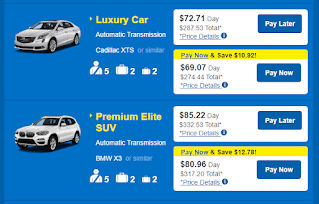What is the cancellation policy for rental car reservations?
When planning a trip or needing transportation for a specific period, renting a car offers convenience and flexibility. However, unexpected changes in travel plans may sometimes necessitate canceling a car rental reservation. Understanding the cancellation policy associated with rental car reservations is crucial for avoiding potential fees and penalties. In this guide, we'll explore common practices and considerations regarding rental car reservation cancellations.
1. Overview of Cancellation Policies:
Rental car companies typically have specific cancellation policies outlined in their terms and conditions. These policies detail the timeframe within which cancellations must be made to avoid fees and penalties. While specific policies may vary among companies, they generally fall into several common categories.
2. Timeframe for Cancellations:
Most rental car companies require cancellations to be made within a certain timeframe before the scheduled pickup time to avoid fees. This timeframe can range from 24 hours to several days, depending on the company's policy. It's essential to review the terms and conditions of your reservation to determine the deadline for cancellations.
3. Fees for Late Cancellations:
Failure to cancel a reservation within the specified timeframe may result in fees or penalties imposed by the rental car company. These fees can vary depending on factors such as the rental duration, vehicle class, and location. Late cancellation fees are typically deducted from the deposit or charged to the credit card on file.
4. Refund Policies:
Some rental car companies offer partial or full refunds for cancellations made within the designated timeframe. However, refund policies can vary, and certain reservations may be non-refundable or subject to cancellation fees regardless of when the cancellation occurs. It's important to review the refund policy associated with your reservation to understand the potential financial implications of canceling.
5. Flexible Booking Options:
In response to evolving travel trends and uncertainties, many rental car companies now offer flexible booking options with relaxed cancellation policies. These options may include the ability to cancel or modify reservations closer to the pickup date without incurring fees. However, such flexibility often comes with slightly higher rental rates.
6. Consideration of Third-Party Bookings:
For reservations made through third-party booking platforms or travel agencies, cancellation policies may differ from those of the rental car company directly. In some cases, third-party bookings may have stricter cancellation policies or additional fees imposed by the booking platform. It's advisable to review the terms and conditions of third-party bookings carefully.
7. Special Circumstances and Exceptions:
Rental car companies may make exceptions to their standard cancellation policies in certain circumstances, such as natural disasters, flight cancellations, or medical emergencies. Providing documentation or evidence to support the reason for cancellation may increase the likelihood of receiving a waiver or refund of cancellation fees.
8. Making Changes vs. Canceling:
In some cases, modifying a reservation rather than canceling it entirely may be a more favorable option. Rental car companies may allow changes to the reservation, such as adjusting the pickup or drop-off dates, without incurring cancellation fees. Review the company's policy regarding reservation modifications to explore alternative options.
9. Communication with the Rental Car Company:
If circumstances arise that necessitate canceling a rental car reservation, it's essential to communicate promptly with the rental car company. Contact their customer service or reservations department to initiate the cancellation process and inquire about any applicable fees or refund options. Providing advance notice of cancellation demonstrates courtesy and may mitigate potential penalties.
10. Tips for Minimizing Cancellation Fees:
To minimize cancellation fees and penalties, consider the following tips:
- Review cancellation policies before making a reservation.
- Keep track of cancellation deadlines and set reminders.
- Opt for flexible booking options when available.
- Consider purchasing travel insurance for added protection.
- Communicate promptly with the rental car company in case of changes or cancellations.
Conclusion:
Understanding the cancellation policy associated with rental car reservations is essential for travelers seeking to avoid fees and penalties. By familiarizing themselves with the terms and conditions of their reservations and adhering to cancellation deadlines, travelers can navigate changes in travel plans with confidence and minimize financial impact. Clear communication with the rental car company and consideration of alternative options can also help mitigate potential challenges associated with cancellations.

.jfif)

.jfif)
Lovely Post
ReplyDelete